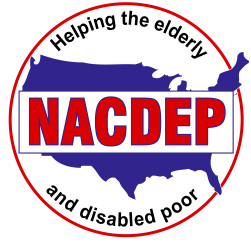VILLAGE OF OAK CREEK, Ariz., Nov. 10, 2021 (GLOBE NEWSWIRE) -- NACDEP, the National Coalition for Dually Eligible People, announced its new Position Paper, "Second-Class Medicare for Dually Eligible People Violates Civil Rights, Worsens Disparities, and Harms Millions. A Case Study of Dually Eligible People with Medicare and Medicaid in New Orleans", on its website, https://nacdep.org.
NACDEP reports the Congressional Balanced Budget Act of 1997 allows 6 million low-income dually eligible Medicare patients living in 42 states to receive only 78% of their Medicare benefit — while high-income Medicare beneficiaries receive 100% of their Medicare benefit. The remaining 22% is a "poverty penalty" for dually eligible people with Medicare and Medicaid.
Dually eligible people — "the elderly and disabled poor" — are the oldest, poorest, sickest, and most disabled people in the nation. They are disproportionately elderly people of color and mentally and physically disabled people.
NACDEP states that decreasing insurance reimbursement for dually eligible patients decreases their access to health care and increases racial healthcare disparities exposed by COVID-19. This healthcare discrimination violates the Civil Rights Act of 1964 and the Americans with Disabilities Act.
Sheldon M Hersh, MD, NACDEP President, practiced medicine for 40 years in poor, racially segregated neighborhoods in New Orleans, where he documented discrimination against low-income dually eligible Medicare-Medicaid patients.
The Balanced Budget Act allows states to decrease payment for low-income dually eligible Medicare-Medicaid patients. As a sad result, Dr. Hersh said, "When Louisiana Medicaid payment for a home visit collapsed to 19% of the Medicare payment, I stopped making house calls to new dually eligible patients. Of all elderly dually eligible patients in my New Orleans medical practice, 96% were African American."
Dr. Hersh continued, "Penalizing elderly and disabled poor people for being poor is socially unjust and morally wrong. Medicare beneficiaries worked, paid Medicare payroll taxes, and purchased equal Medicare benefits. It takes only the flip of a legislative switch to decrease racial healthcare disparities created by the Balanced Budget Act of 1997."
CONTACT:
Sheldon M Hersh, MD, President
NACDEP, the National Coalition for Dually Eligible People
Website: https://nacdep.org
Email: info@nacdep.org
Telephone: 1-504-723-5099
ABOUT NACDEP:
NACDEP is a not-for-profit educational organization dedicated to improving access and health care for dually eligible people with Medicare and Medicaid — "the elderly and disabled poor".
NACDEP seeks to turn healthcare disparity into healthcare equality while saving healthcare dollars.
#####
Related Images

Image 1: NACDEP logo
NACDEP logo
This content was issued through the press release distribution service at Newswire.com.
Attachment
